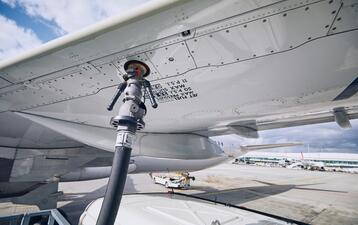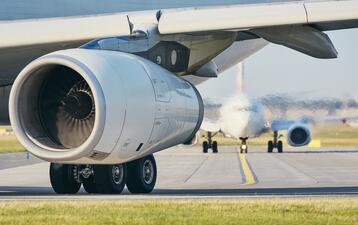Introduction to Sustainable Aviation
The impact of aviation on the environment is of great importance to all stakeholders involved. Public concern about climate change and the associated environmental and societal consequences require regulation and multiple improvements to the aviation sector's sustainability performance: How to lower the carbon footprint of apron processes? What are the challenges and potentials linked to sustainable aviation fuels (SAF) or hydrogen-powered aircrafts? How can airports strengthen their resilience to the impacts of climate change on airport operations? These questions represent only a very small part of the content of this two-day introduction course about sustainable aviation. Especially for someone new to the topic of environmental protection and sustainability in aviation, it can be a major challenge to understand the latest technological trends and the associated technical background, legal aspects, operational regulations and requirements, and their interrelationships.
This course is intended for a wide range of interested parties who want to approach the topic of sustainable aviation and the related issues of noise, emissions and air quality, and climate change at both the global and local levels. Attendees will get a solid overview on actions and mitigation measures to lower the impact of aviation on global climate and the airport environment. All lectures will contain state-of-the-art technological knowledge on mitigation measures, based on latest scientific and industrial conclusions, current standards, legal requirements and future trends as well.
This course is the condensed version of the 3 day course Aircraft Noise and Environmental Protection at Airports.
Course Details
Location:In-houseLanguage:English
Duration:2 days
Provider:airsight GmbH
Course Content
Aviation and the impact on the environment
- Global level: Greenhouse gas emissions (GHG), e.g. CO2 emissions
- Local level: aircraft, emissions and air quality, waste, water, wildlife and biodiversity
Regulatory framework
- International standards and policies, European regulations, directives and specifications
Environmental impact mitigation measures
- Technological: e.g. engine technology, aircraft technology
- Operational: e.g. noise abatement flight procedures, single engine taxi
Environmental management systems
- Airport Carbon Accreditation
- EU EMAS / ISO 14001
Market-based measures on greenhouse gas reduction
- CORSIA
- EU-ETS
Future concepts, developments and technologies on aviation sustainability
- Aircraft: Sustainable Aviation fuels (SAF), Electric aircraft / hydrogen aircraft
- Sustainable energy production on site and associated risks
- Sustainable operational concepts (e.g. TaxiBots)
Methods for evaluating and assessing sustainability and associated impacts on people and the environment
Adaptation and resilience of airports on climate change impacts
After participating at this training course, attendees will have the following knowledge:
- Aviation impact on global climate and the environment around airports
- Relevant legal requirements, standards and policies
- Environmental management systems and market-based measures on greenhouse gas reduction
- Mitigation measures and global initiatives to lower impacts of aviation on the environment
- Challenges and potentials of climate change on airport systems: future aircraft technologies, airport efficiency, operational concepts, and climate resilience
Trainer
Christoph Struempfel-Seifert, M.Sc.
Head of airsight’s Sustainable Aviation department
Mr Struempfel-Seifert is an expert for sustainable aviation and is responsible for all project tasks related to sustainable aviation and environmental protection at airports. Furthermore, he is an appreciated trainer, sharing his knowledge and practical experience with other national and international aviation experts.
After graduating as Master of Science in Aeronautics and Astronautics from the Technical University of Berlin, he worked as a research assistant and lecturer at the Chair of Flight Guidance and Air Transport at the TU Berlin. In his scientific career, he focused on modelling aircraft noise and emissions, UAS noise measurements and calculation as well as the optimization of flight procedures with respect to environmental and eco-efficiency targets.
For airsight, he has conducted several environmental assessments, noise and emissions studies for various airports in Germany, Luxembourg, United Arab Emirates, Romania and the Philippines. As a recognized SME for aircraft noise modeling, he has extensive experience with the FAA's Aviation Environmental Design Tool (AEDT).
A second major focus of his work is to support international airports on their decarbonization journey with detailed studies on renewable energy, in particular the implementation of solar energy systems, including Singapore-Changi, Berlin, Cologne, Düsseldorf, Stuttgart and various other airports. His team is helping airports meet the challenges of the future through new, sustainable technologies, such as sustainable aircraft taxiing and e-GSE implementation.
Target Group
- Aerodrome accountable managers
- Aerodrome engineers and planners
- Aerodrome quality and compliance managers
- Aerodrome services and ground handling contractors
- Aerodrome trainers
- Airline representatives
- Civil aviation authority representatives
- Approval authority representatives
- Air Navigation Service Provider
- Environmental engineers
- All Professionals who want to familiarize themselves with sustainable aviation
Organisational Details
airsight offers this training course on request, worldwide. At the end of the course, all participants will receive an airsight certificate based on EASA training regulations, which is highly recognised throughout the aviation industry.
About airsight Training
airsight Training course quality
airsight operates an ISO 9001 certified Quality Management System and pursues the objective to provide high quality services that fully meet the clients’ needs.

 Training 5 or more people? Ask for an In-house course at your premises or online!
Training 5 or more people? Ask for an In-house course at your premises or online!


